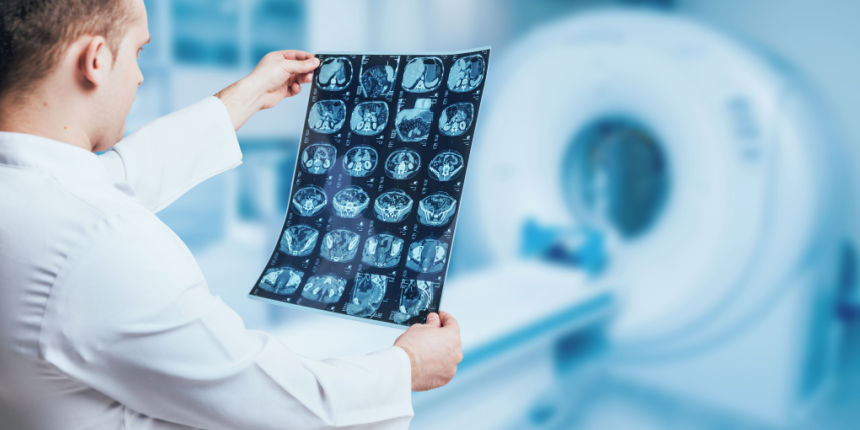Radiology Technician Courses - Fees, Duration, Eligibility, Top Colleges
Radiology is a field of paramedical science concerned with the use of technology and diagnostic procedures to image the interior organs of the human body and diagnose illnesses. Radiologist works closely with physicians and play a crucial role in the diagnosis. With the use of technology, radiologists employ radiographs to accurately diagnose a patient's ailment or injury.

X-rays, sonography, computed tomography (CT), and nuclear medicine procedures like PET scans and MRIs are just a few of the imaging methods that radiologists utilise to identify and treat disorders. Success in the field of radiology has been made possible by the recent rapid growth of imaging technology.
Diagnostic radiology and interventional radiology are the two primary subfields of radiology. Imaging techniques are employed in diagnostic radiology to identify abnormalities or injuries in patients. However, interventional radiology uses imaging techniques to direct the delivery of medical treatments through tiny incisions.
Also Read: Top Radiology Colleges in India
Best Radiology Technician Courses
This article discusses the best radiology technician course one can enrol in after graduating from high school to start a career in this area. Below, we have highlighted some of the courses, their duration, and provider colleges.
| Course | Duration | Top Institutes |
|---|---|---|
3 years | AIIMS Rishikesh, DMIHER, Revathi College of Nursing, Tirupur, Balashree Institute of Paramedical Sciences, Jabalpur | |
3 years | PGIMER Chandigarh, JIPMER Puducherry, AIIMS Rishikesh, AIIMS Bhubaneswar | |
Diploma in Radiology | 2 years | NIMS University, Jaipur, University of Technology, Jaipur, NEFTU, SunRise University, Alwar |
Diploma in Medical Lab Technology (DMLT) | 2 years | KGMU Lucknow, IPGMER Kolkata, AFMC Pune, PM Polytechnic, Sonepat. |
(Note: Data has been collated by team Careers360)
Radiology Technician Courses: B.Sc Radiology
B.Sc Radiology or Bachelor of Science in Radiology is a three-year undergraduate degree programme. It provides knowledge of diagnosing and treating diseases utilising image techniques such as X-rays, ultrasounds, MRI, and CT scans. The curriculum instructs students to use various imaging techniques to help them with patients and gather important patient data.
Students who have graduated with a B.Sc in Radiology course can work in a variety of settings, including the public and private sectors, healthcare facilities, and cancer treatment facilities. Some of the important course details such as eligibility, course duration and a list of top providers are listed below.
Eligibility: A minimum of 50 per cent marks in class 12, with PCB as a subject
Duration: Three-years
Top Institutes:
- AIIMS Rishikesh
- DMIHER
- Revathi College of Nursing, Tirupur
- Balashree Institute of Paramedical Sciences, Jabalpur
Radiology Technician Courses: BSc Medical Lab Technology
B.Sc Medical Lab Technology abbreviated as B.Sc MLT is an undergraduate degree programme. It provides information related to various testing techniques such as blood testing, blood typing and other analysis. It focuses on utilising a clinical laboratory to detect illnesses.
Graduates with medical lab technology have a wide range of employment choices in different industries. They can apply for job profiles in both public and private medical settings, including blood donation facilities, ERs, laboratories and other facilities.
Eligibility: A minimum of 50 per cent marks in class 12, with PCB as a subject
Duration: Three to four years
Top Institutes
Radiology Technician Courses: Diploma in Radiography
A Diploma in Radiography provides knowledge related to medical research and treatment. The course focuses on providing hands-on experience in using diagnostic tools such as ultrasonography, X-rays, and MRIs. In addition to diagnostics, therapeutic variables like cancer and radiation therapy for tumours are also taught during the curriculum.
The chances for career and service are greatly increased by these courses in India. As time goes on, diagnoses become more useful, and more experts will be needed. Accurate testing guarantees that illnesses are diagnosed early and that patients get the best treatment.
Eligibility: A minimum of 50 per cent marks in class 12, with PCB as a subject.
Duration: Two-years
Top Institutes:
Radiology Technician Courses: Diploma in Medical Lab Technology
In the Diploma in Medical Lab Technology course, students learn how to recognise, analyse, and examine cells, organs, and bodily fluids as well as contribute to the diagnosis, treatment, and management of illness. This diploma programme aims to provide students with a broad understanding of the subjects of histology, microbiology, organic chemistry, and histology.
The course also provides the necessary knowledge required to carry out precise clinical lab tests and use high-end laboratory equipment. A well-functioning medical facility must have an MLT because the analysis carried out by laboratory technicians provides clinicians with the knowledge they need for precise diagnosis and treatment.
Eligibility: A minimum of 50 per cent marks in class 12, with PCB as a subject.
Duration: Two-years
Top Institutes:
Radiology Scope in India
In India, the field of radiology is expanding quickly. There are many options to think about in the subject of radiology, and the number of establishments offering specialisations is increasing. As a result of these advancements, opportunities for those interested in radiology are rapidly growing.
Graduates in radiology are qualified for positions in a range of research organisations, clinics, and nursing homes. Radiology experts are paid differently depending on the institutions or organisations they work for. However, the normal yearly salary for a radiography technician is about Rs 3-5 lakh, as per Payscale.
Frequently Asked Questions (FAQs)
Radiology is a subfield of paramedical science that is concerned with the use of technology and diagnostic procedures to image the interior organs in the human body and diagnose illnesses.
Diagnostic radiology and interventional radiology are the two primary subfields of radiology.
Graduates in radiology can find work in a variety of settings, including the public and private sectors, care facilities, and cancer treatment facilities.
X-rays, ultrasounds, MRIs, CT scans, and PET scans are some of the diagnostic techniques used by radiologists.
The normal yearly salary for a radiography technician is about Rs. 3-5 lacs.